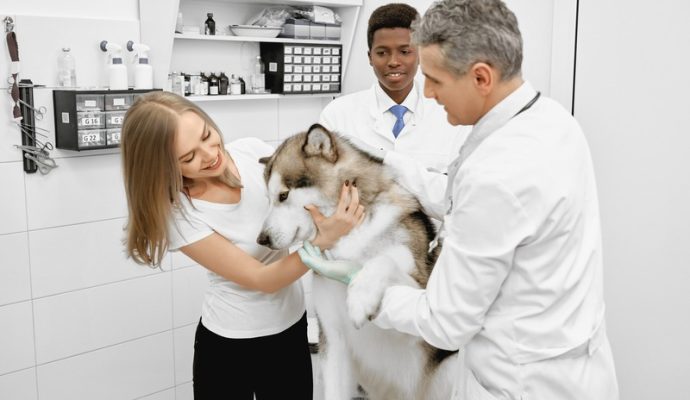When we bring a furry friend into our lives, it’s not just about the snuggles and playtime. There’s a whole lot that goes into keeping them healthy and happy, including those routine jabs at the vet. We’re talking about vaccines — yup, pets need those protective shots just like humans do. But what happens if we decide to skip them, whether to save a penny or simply due to a hectic schedule? Let’s examine the potential hazards of neglecting to provide our pets with their necessary vaccinations.
Common Diseases Prevented by Vaccines
Here’s a quick look at the mischief-makers that cat and dog vaccinations help tackle:
-
Parvovirus and distemper in dogs are notorious for causing fatal illness, and your pup might catch them from contaminated environments, even without direct contact with sick dogs.
-
Feline panleukopenia is like the feline version of parvovirus and can hit kittens extremely hard.
-
Rabies is a real horror story for pets and humans alike, and it’s legally required in many places to keep this villain at bay.
The list goes on, but these heavy hitters show why vaccines are top on the to-do list for pet health.
Risks of Skipping on the Jab
When we miss out on vaccinating our pets, we’re opening a door for diseases to waltz right in. It can lead to some serious health issues or, worse, a heartbreaking goodbye. Let’s get into what could go wrong.
Illness and Disease
Without vaccines, ordinary bugs can throw an illness party in our pets’ bodies. This isn’t just a bummer for their health but can also lead to:
-
Pain and discomfort for our furry friends.
-
Sky-high vet bills that could have been avoided.
-
The potential spread of disease to other animals or even to us, in the case of zoonotic diseases like rabies.
Public Health Concerns
Pets that aren’t vaccinated can be little typhoons of disease, spreading viruses and bacteria to other animals and humans. This can lead to outbreaks that are dangerous and costly to control.
But What About Side Effects?
It’s valid to worry about side effects — we all want what’s best for our pets. But the reality is that serious reactions are rare. Most of the time, any side effects are mild, like a bit of soreness where the shot was given or a few hours of low energy.
When Side Effects Do Happen
On the off chance your pet does have a reaction, it’s likely to be one of these:
-
Mild fever
-
Reduced appetite and activity
-
Discomfort at the injection site
-
Sneezing or mild respiratory symptoms for intranasal vaccines
Usually, these symptoms clear up on their own. If something seems off, a quick chat with your vet can give you peace of mind.
Life Without Vaccines
Picture this: Your unvaccinated pooch meets a new buddy who seems healthy but is silently carrying a virus. Without the shield of a vaccine, your pup is wide open to attack. It can turn into a serious illness, tackling not just your pet but your wallet and potentially your family’s health.
Community Risk
Then there’s the whole herd to think about. When more pets in the community are vaccinated, all our furry buddies are safer. This is what’s known as herd immunity, and it’s lost when vaccination rates drop, leaving more critters susceptible to disease.
Are There Safe Alternatives to Vaccines?
Some folks turn to homeopathic or natural alternatives, hoping to give their pets a gentler defense. While a healthy diet and lifestyle are essential, there’s just no scientific backup that these alternatives can replace the protection that vaccines provide. It’s like putting their health on hope and a prayer, which isn’t the sturdiest safety net.
Setting Priorities
The bottom line is that while there are choices in healthcare, it’s crucial not to overlook vaccines. They have been a game-changer in the world of pet health, turning previously fatal diseases into preventable ones.
Finding the Right Vet and Staying Informed
While we’re on the lookout not to skip vaccines, let’s remember the importance of trusted vet care. Veterinary facilities like Goleta Airport Pet Hospital offer comprehensive healthcare for our pets, ensuring that they’re getting the quality care they need, including those all-important shots.
Questions to Ask Your Vet
Always feel free to ask your vet questions about your pet’s healthcare plan. Here are a few to keep in mind:
-
What vaccines are essential for my pet’s lifestyle?
-
How often should my pet be vaccinated?
-
What should I watch for after vaccinations?
Armed with the right info, we can make the best decisions for our fur babies.
What About Dental Care?
While we’re on the topic of health, let’s not forget about those pearly whites. Dental health is another crucial aspect of our pets’ overall well-being. A skilled pet dentist in Goleta, CA, can help ensure your pet’s mouth is in tip-top shape. Dental problems can sneak up on us, and before you know it, they can lead to other health issues. It’s best to stay proactive with regular check-ups.
Final Thoughts
In summary, overlooking pet vaccinations is a risk that’s simply not worth taking. Vaccines offer prevention, which is the bedrock of pet health. Lean on science, heed your vet’s guidance, and protect your furry loved ones—their health is paramount. Partner with a reliable veterinary hospital to manage their well-being. Our pets are family and friends, and vaccinating them is a clear expression of our love and dedication to their lifelong health and happiness. Let’s ensure our affectionate interactions are backed by responsible pet care.




